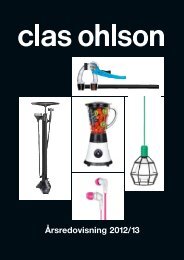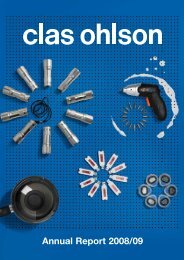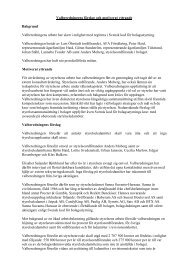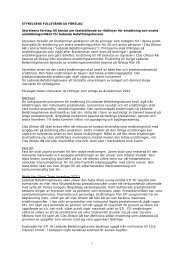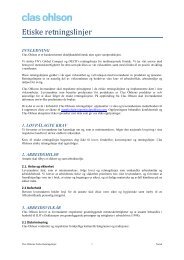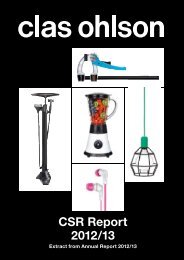Annual Report 2012/13 - Clas Ohlson
Annual Report 2012/13 - Clas Ohlson
Annual Report 2012/13 - Clas Ohlson
You also want an ePaper? Increase the reach of your titles
YUMPU automatically turns print PDFs into web optimized ePapers that Google loves.
Cont. Director’s report<br />
Employees<br />
The number of employees in the Group was an average<br />
of 2,524 (2,370), of whom 1,097 (1,000) were women.<br />
The distribution by country is 1,397 (1,305) in Sweden,<br />
665 (628) in Norway, 223 (190) in Finland, 191 (210) in<br />
the UK and 48 (37) in China. Further information about<br />
employees is found in Notes 6 and 31 in the <strong>Annual</strong><br />
<strong>Report</strong>.<br />
Risks and uncertainties<br />
<strong>Clas</strong> <strong>Ohlson</strong>’s business operations are exposed to financial<br />
and operational risks. Financial risks comprise primarily<br />
wage inflation, raw-material prices, transport costs and<br />
exchange-rate exposure, while operational risks relate to<br />
establishment in the UK and Germany, purchasing in Asia,<br />
IT systems, competition, logistics, key employees, social<br />
responsibility, product range and shrinkage. With regard<br />
to the description and quantification of the financial risks,<br />
these are stated in Note 2 of the <strong>Annual</strong> <strong>Report</strong> and on<br />
pages 24–26 in the printed annual report.<br />
Social responsbility<br />
Continuous work is conducted at <strong>Clas</strong> <strong>Ohlson</strong> with respect<br />
to social responsibility, including follow-up activities relating<br />
to our Code of Conduct. This work is de scribed on<br />
pages 27–43 in the printed annual report and on the<br />
company’s website: about.clasohlson.com.<br />
Environmental impact<br />
The company has a duty of notification with respect to<br />
the activity relating to the temporary storage of electronic<br />
waste. This duty of notification applies to any Swedish<br />
municipality in which <strong>Clas</strong> <strong>Ohlson</strong> has a store. The company<br />
does not otherwise have any operations for which<br />
there is a duty of notification or for which it is mandatory<br />
to obtain a permit under the Environmental Code. With<br />
regard to electrical and electronic waste, the company<br />
cooperates with the Elkretsen organisation in Sweden,<br />
which is the joint company owned by the electrical industry<br />
for waste disposal. The company is affiliated to the<br />
recycling organisation REPA. In Norway, the company is<br />
affiliated to the recycling organisations AS Batteriretur,<br />
Renas AS, Elektronikkretur AS and Hvitvareretur AS. In<br />
Finland, there is equivalent cooperation with Serty and in<br />
the UK with Valpak.<br />
Environmental work is undertaken continuously in the<br />
Group, and this is described in greater detail on pages<br />
40–43 of the printed annual report and on the website,<br />
about.clasohlson.com<br />
Guidelines for remuneration of senior management<br />
The general principles of remuneration for senior management<br />
are to be based on the position held, individual performance,<br />
the Group’s financial results and the remuneration<br />
being competitive in the country of employment. The<br />
combined remuneration of senior management shall consist<br />
of basic salary, variable salary in the form of a shortterm<br />
incentive based on annual performance objectives,<br />
long-term incentives based on performance over several<br />
years, pension and other benefits. In addition to this, there<br />
are terms applicable on notice of termination and severance<br />
pay.<br />
<strong>Clas</strong> <strong>Ohlson</strong> will strive to offer competitive total remuneration<br />
levels with a focus on performance-based remuneration.<br />
This means that the variable remuneration could<br />
comprise a significant portion of the total remuneration.<br />
The objective is that the basic remuneration should be the<br />
median to the comparable market, while the total remuneration<br />
shall be in the upper quartile of the market, when<br />
<strong>Clas</strong> <strong>Ohlson</strong> AB achieves or exceeds its targets.<br />
Basic salary<br />
Basic salary will constitute the basis for total remuneration.<br />
The salary level will be related to the relevant market and<br />
reflect the degree of responsibility the work entails. The<br />
trend for the basis salary shall be based on the degree<br />
of performance and how well employees develop their<br />
expertise in order to assume future assignments with<br />
greater responsibilities. The basic salary will be reviewed<br />
annually to ensure that it is commensurate with the market<br />
and competitive.<br />
Variable salary (Short Term Incentive “STI”)<br />
Senior management will receive, in addition to basic salary,<br />
STI for results that surpass one or more predetermined<br />
levels of performance during a financial year designed to<br />
promote the company’s long-term value creation. Clearly<br />
defined performance goals are decided annually by the<br />
Board or by individuals appointed by the Board. The performance<br />
goals may be financially and personally connected<br />
to the operations. The remuneration from the STI<br />
programme has a limit (ceiling), which means that <strong>Clas</strong><br />
<strong>Ohlson</strong> AB is able to calculate the maximum remuneration<br />
levels from the onset. To the extent a performance does<br />
not correspond to the lowest performance level, no STI<br />
will be paid. STI shall depend on the position held and<br />
may amount to a maximum of 50 per cent of the salary<br />
upon achieving the ceiling level, which also constitutes the<br />
maximum outcome of STI. The STI remuneration is also<br />
conditional upon the performances on which earnings are<br />
based being sustainable over time, and that <strong>Clas</strong> <strong>Ohlson</strong><br />
AB is able to reclaim such remuneration paid that were<br />
based on information that later turned out to be erroneous.<br />
Long-term incentives (”LTI”)<br />
The objective of the LTI programmes is to generate conditions<br />
for retaining and recruiting competent personnel<br />
to the Group. The programmes were designed because<br />
it had been deemed desirable that participants to a<br />
larger extent are shareholders in the company, which is<br />
expected to have a positive impact on their long-term<br />
work input. Connecting participants’ rewards to the<br />
company’s income and value development will foster<br />
company loyalty and thus the long-term value growth in<br />
the company.<br />
The long-term incentive programme will entitle employees<br />
to acquire shares conditional upon approval by the<br />
AGM. During the financial year, LTI 2010, LTI 2011 and<br />
LTI <strong>2012</strong> were in progress. Following the end of the<br />
56<br />
Director’s report




